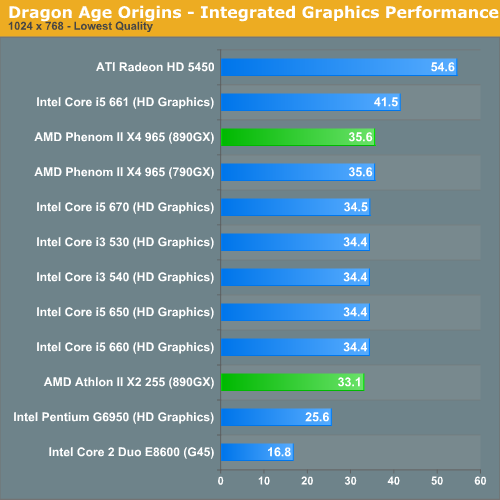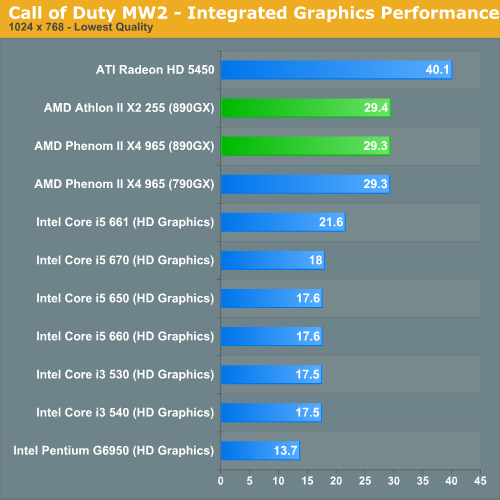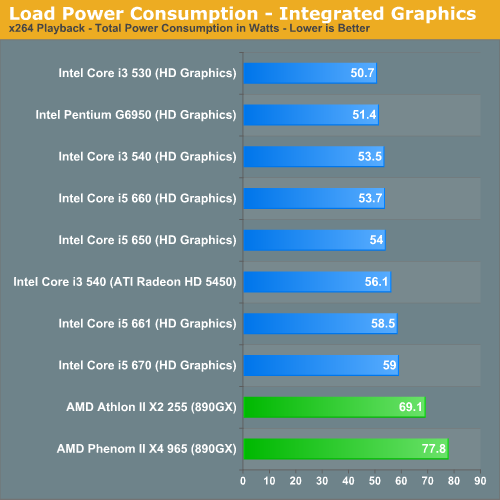The Rest of Clarkdale: Intel's Pentium G6950 & Core i5 650/660/670 Reviewed
by Anand Lal Shimpi on March 24, 2010 4:00 PM EST- Posted in
- CPUs
Integrated Graphics Performance
In our 890GX review I looked into integrated graphics performance of the entire Clarkdale lineup vs. AMD's chipset offerings. You can get a look at the full set of data here, but I'll also provide a quick summary here.
Intel's best case performance happens in our Dragon Age Origins benchmark:

Thanks to its 900MHz GPU clock the Core i5 661 does much better than AMD's integrated graphics. The rest of the Clarkdale lineup is basically on par, and the Pentium G6950 is a bit slower. Note that the G6950 is still over 50% faster than G45. That was just a terrible graphics core.
The worst case scenario for Intel's integrated graphics comes up in Call of Duty Modern Warfare 2:

Here even the Core i5 661 can't best AMD's 890GX. Intel's integrated graphics performance can range from much slower to competitive if not faster than AMD's depending on the game. Unfortunately in a couple of key titles Intel is much slower. Using GPU clock speed as a means to differentiate CPUs isn't a wise move if you're trying to build up your reputation for not having terrible graphics.
If you're not going to do any gaming and you're using the integrated graphics for Blu-ray playback, it's a much better story for Intel.

Under load the entire Clarkdale line is very conservative with power consumption.
Full Data in Bench & The Test
We're presenting an abridged set of benchmarks here in the review to avoid this turning into too much of a graph-fest. If you want to see data that you don't see here check out all of these CPUs and more than 100 others in Bench.
| Motherboard: | ASUS P7H57DV- EVO (Intel H57) Intel DX58SO (Intel X58) Intel DX48BT2 (Intel X48) Gigabyte GA-MA790FX-UD5P (AMD 790FX) |
| Chipset Drivers: | Intel 9.1.1.1015 (Intel) AMD Catalyst 8.12 |
| Hard Disk: | Intel X25-M SSD (80GB) |
| Memory: | Qimonda DDR3-1066 4 x 1GB (7-7-7-20) Corsair DDR3-1333 4 x 1GB (7-7-7-20) Patriot Viper DDR3-1333 2 x 2GB (7-7-7-20) |
| Video Card: | eVGA GeForce GTX 280 |
| Video Drivers: | NVIDIA ForceWare 180.43 (Vista64) NVIDIA ForceWare 178.24 (Vista32) |
| Desktop Resolution: | 1920 x 1200 |
| OS: | Windows Vista Ultimate 32-bit (for SYSMark) Windows Vista Ultimate 64-bit |










70 Comments
View All Comments
larson0699 - Thursday, March 25, 2010 - link
Oops. 200MHz of GPU (was thinking 700 rather than 733).If I didn't correct me, I'd have been corrected. Done.
juampavalverde - Wednesday, March 24, 2010 - link
Anand, as soon as i started to read, imho, noticed the lack of the most close match por the g6950, an athlon II 250 paired with a value chipset 785g (not close in price, amd is cheap, but they look similar in tech), and also for a price match there a 785g board with an athlon II x3 or x4. ¿There are chances of getting such information in this review? Specifically the 785g to compare the value side of this new pentium against an amd platform.kaleun - Wednesday, March 24, 2010 - link
true, there should be a platform price comparison. whoever is cheap enough to buy the Pentium also would buy a cheaper AM3 board. This could create a more serious price gap for similar performance.Rick83 - Wednesday, March 24, 2010 - link
Thorough article - but there's something that's bugging me lately.There are almost no benchmarks regarding dm-crypt performance on the web.
With dm-crypt/truecrypt/bitlocker being the mainstay in personal encryption, and encryption-assist x86 extensions making their way into mainstream CPUs (and being used as distinctive feature), I'd like to see some data gleaned from testing.
It's important to know after all, whether the CPUs these days are fast enough to maintain a bit of headroom while keeping the IO-buffers full.
I'd be grateful if you were to consider that as an addition to your benchmark line-up.
Calin - Thursday, March 25, 2010 - link
The VIA Nano processors had support for hardware-accelerated encryption more than a couple of years ago.Rick83 - Thursday, March 25, 2010 - link
I'm aware of that.But I'm not aware of anyone actually using VIA CPU's, hence my use of the word "mainstream". i5 6xx's will be sold in retail like hotcakes, on the other hand - they' probably already shifted near as many units as an entire run of VIA cpus consisted of...
yuhong - Wednesday, March 24, 2010 - link
Yep, the Core i5 600 series have support for AES and PCLMULQDQ instructions, and it is sad to see they didn't bother to benchmark that. Luckily Tom's Hardware did and has the results.Anand Lal Shimpi - Wednesday, March 24, 2010 - link
We actually tested AES-NI in our Clarkdale review back in January:http://www.anandtech.com/cpuchipsets/showdoc.aspx?...">http://www.anandtech.com/cpuchipsets/showdoc.aspx?...
Take care,
Anand
Rick83 - Thursday, March 25, 2010 - link
Yes, that sort of test is what I did/do find in heaps around the net.But I'd rather prefer to see a more in-depth benchmark of encryption. This test doesn't show me how well a similarly priced Phenom would fare, or how well AES-NI scales with regard to clock speed and cores (hopefully linearly in both cases - but there are no hard numbers).
Additionally, Bitlocker is only one part of the equation; I'm not sure about market penetration, but dm-crypt should be considered a major player. This could also be relevant for the IT section of the site, as the Clarkdale based Xeons (and Gulftown in the future) all have different throughput available, and probably make an encrypted RAID far more transparent than an "old" Nehalem.
This is probably also quite relevant, as one can expect AMD to implement those extensions themselves, for their next hardware.
Thanks for reading,
Rick
Perisphetic - Tuesday, March 30, 2010 - link
speaking of the devil,are we going to see also some of the Intel vPro marchitecture benchmarks here too?
I'd like to see how this hardware accelerated encryption alleviates the workload on these CPUs compared to more traditional software solutions and/or other hardware based encryption concoctions.